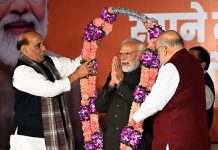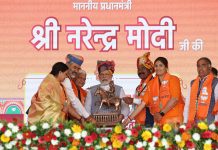 It was shocking for citizens to see four senior-most judges of the Supreme Court approach the media to express their helplessness in delivering justice. All four — Justices J Chelameswar, Ranjan Gogoi, MB Lokur and Kurian Joseph — were categorical in their assertion that the judiciary was being run arbitrarily and it was dangerous for democracy.
It was shocking for citizens to see four senior-most judges of the Supreme Court approach the media to express their helplessness in delivering justice. All four — Justices J Chelameswar, Ranjan Gogoi, MB Lokur and Kurian Joseph — were categorical in their assertion that the judiciary was being run arbitrarily and it was dangerous for democracy.
Many believe that the situation described by the judges is similar to what is going on in other institutions of our democracy. It is believed by many quarters that the incident of judges coming before the press should not be viewed in isolation; this is part of the overall story of the current state of affairs in our democracy. The assertion of the four judges testifies this view.
“Four of us are convinced, democracy will not survive. We met CJI this morning, with specific request but we could not convince him. We had no choice but to communicate to the nation to take care of the institution. We place it before people of the country,” Justice Gogoi said. The same was expressed by Justice Chelameswar, the second senior-most judge in the apex court: “We don’t want wise men saying 20 years from now that Justices Chelameswar, Gogoi, Lokur and Joseph sold their souls and didn’t do the right thing by our constitution.”
“We wrote a letter to him and tried to persuade the CJI to take steps but failed. A request was made to do a particular thing in a particular manner but it was done in such a way that it left further doubt on the integrity of the institution. Unless the institution of Supreme Court is preserved, democracy won’t survive in this country,” he said.
The language used by the judges explains the situation they have been facing in performing their duties. The fact that all four judges are part of the collegium which appoints judges of the Supreme Court and the high courts only points to the extent of vulnerability the judicial machinery is now exposed to. Justice Gogoi is next in line and will take over as CJI after Justice Misra retires. Though the judges did not give details of what was the immediate trigger for rushing to the media, it is apparent that assigning of Public Interest Litigation (PIL) petitions demanding investigations into the controversial death of CBI judge BH Loya to a junior bench was what led them to take the extreme step.
“There have been instances where cases having far reaching consequences for the nation and the institution had been assigned by the Chief Justices of the Court selectively to the benches of their preference without any rationale basis for such assignment. This must be guarded against at all costs,” says the letter which was written to the CJI by the four judges. The letter raises the issue of Memorandum of Procedure (MoP) for appointment of judges of the Supreme Court and high courts. It says that the MoP was finalized and sent by the then CJI to the Central government in March, 2017. The government has not responded to the communication and in view of this silence, it must be assumed that the MoP as finalized by the collegium has been accepted by the government on the basis of a previous order of the apex court.
“There was, therefore, no occasion for the Bench to make any observation with regard to the finalization of the Memorandum of Procedure or that that issue cannot linger on for indefinite period,” says the letter. It refers to the order of a two-judge bench on October 27, 2017 in which a bench of Justices AK Goel and UU Lalit had issued notice to the Centre and directed the presence of the Attorney-General. It had also ordered that there should be no further delay in finalization of MoP in larger public interest.
The CJI constituted another three-judge bench headed by him to consider the issue arising out of the two-judge bench. The three-judge bench recalled the order of the two-judge bench on the ground that “these are not matters to be taken up on the judicial side like this”. The MoP is dealt with by the administrative side of the Supreme Court.
The letter says that any issue with regard to the MoP should be discussed in the Chief Justices’ Conference and by the Full Court. Such a matter of grave importance, if at all required to be taken on the judicial side, should be dealt with by none other than a Constitution Bench.
In reply to a question by a journalist, Justice Gogoi did admit that their move, in part, was prompted by concerns over the death of Justice Loya in 2014.
Justice Loya was hearing the case of the alleged fake encounter of Sohrabuddin Sheikh in Gujarat. The case had high profile accused including BJP president Amit Shah, then Minister for Home in Gujarat. The judge who succeeded Justice Loya after his death discharged Shah within a month.
The death was not investigated even as questions were raised by his son who wrote a letter in 2015 expressing doubts over the circumstances in which his father died.
The issue gained momentum after an investigative story in Caravan magazine, in which the father and the sister of Justice Loya expressed their suspicion over the circumstances of the death. Though the son retracted from his stance and claimed before the media that he had no doubts, Bombay Lawyers’ Association filed a case before the High Court.
Meanwhile, political activist Tehseen Poonwala and journalist BS Lone filed two separate petitions in the SC demanding a probe into his death. The case was assigned to Justice Arun Misra. It was alleged that Justice Misra was deliberately assigned the case by the CJI as he was confident that relief would be given to the BJP. However, after the press conference of senior most judges, Justice Arun Misra ordered the Maharashtra Government to submit documents related to the death and wanted the case to be heard by another bench. The case is now being heard by a three-judge bench headed by the CJI. The three-judge bench has ordered that all petitions filed in the case including the one that has been filed in the Bombay HC will be heard in the SC.
Another case which is being cited as the bone of contention between the CJI and the senior judges is the case of recognition of Prasad Medical College, Lucknow. The Medical Council of India had rejected its recognition and the college fought a legal battle in the HC and the SC. The CBI has even arrested a former judge in the bribery scandal pertaining to the case which was aimed at ‘fixing’ judges. The CBI has applied to the SC to investigate a sitting judge of Allahabad High Court. The case was heard by a bench headed by the CJI and the Prasad Medical received relief from it.
The case became controversial and in November last year Justice Chelameswar ordered, in response to a petition by Advocate Kamini Jaiswal that the case should be heard by another five-judge bench of senior judges. The CJI intervened and ordered that he alone was the Master of Roster, and hence, only he could assign cases to benches.
SC lawyer Prashant Bhushan has demanded an in-house inquiry into the conduct of the CJI by five senior-most judges including the four who had come before the media. In his complaint to the five senior-most judges, Bhushan has contended, “The facts and circumstances relating to the Prasad Education Trust case show prima facie evidence suggesting that CJI Misra may have been involved in the conspiracy of paying illegal gratification in the case, which at least warrants a thorough investigation.” He has also demanded inquiry into few other charges of impropriety against the CJI.
After the press conference of four judges, several parleys were held between the judges and the CJI. Bar Council of India also met the judges and the CJI to resolve the matter. It was claimed that the matter has been resolved. However, it does not seem to be so. None of the two cases cited above seems to have received the treatment to the satisfaction of the complaining parties.
In the case of Justice Loya’s death, the two counsels of interveners — Dushyant Dave and Indira Jaisingh — wanted the SC not to bar the High Court from hearing the matter. However, this was not accepted by the court. The motive of petitioners who went to the SC to demand the investigations is also being doubted. Petitioner Tehseen Poonawala has been disowned by the Congress, the party he claims allegiance to. Another petitioner BS Lone is reportedly close to a BJP leader from Mumbai. Both petitioners are being seen to be on the side which does not want an independent probe.
The medical scam case is very contentious. Bhushan and others are targeting the CJI for not allowing probe into the conduct of a sitting judge of the Allahabad High Court who had previously heard the case. Former Orissa HC Judge IM Qudussi was arrested by the CBI and released on bail. This is the first time that the judiciary has invited crisis on its own. During the days of Indira Gandhi, the executive directly intervened and manipulated the apex court. She got Justice AN Ray appointed to the post of CJI by superseding senior judges. At that time, the executive was making appointments and had a say in the affairs of the Supreme Court. However, when we see Supreme Court judgements in Keshvanand Bharati Case or in Golaknath Case that the basic structure of the Constitution cannot be touched and fundamental rights cannot be curtailed by Parliament, we find examples of independence of the judiciary. We hardly have any such examples in the recent past.
Will the move of the four judges help the judiciary to regain its ground? This seems unlikely. CPM leader Sitaram Yechury has even initiated the move to unite the Opposition to propose impeachment of CJI Misra. JD(U) leader Sharad Yadav has supported the move. CPI leader D Raja even went to meet Justice Chelameswar. Nripendra Misra, Principal Secretary to the Prime Minister, was seen at the doors of the CJI, who, however, avoided meeting him. These developments point to a situation where the judiciary is unable to shield itself from outside interference. It will be really disastrous to have a judiciary which is exposed to interferences from the executive or the legislature. In India, immunity of judiciary to such interferences is absolutely essential because it is the custodian of our Constitution.
letters@tehelka.com













